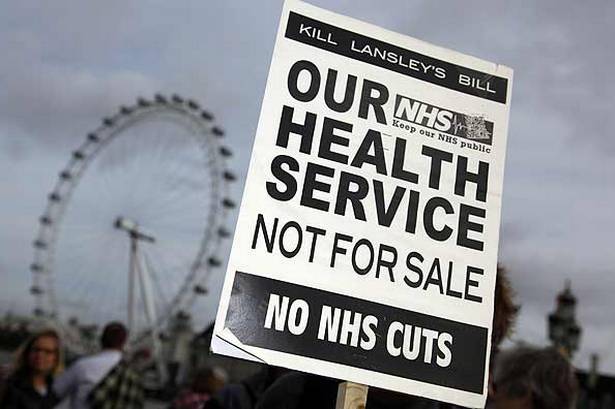The
BBC have admitted to not challenging Andrew Lansley on two donations he accepted from individuals in private healthcare, yet fail to accept any wrongdoing.
When
Andrew Lansley unveiled his plans to restructure the NHS and increase the
opportunities for private healthcare providers, it would be reasonable to
expect alarm bells to ring inside the heads of journalists. Yet as the Health and Social Care bill was being debated in
parliament with accusations of privatisation shouted from all and sundry, the BBC remained
silent.
His connections
When shadow health secretary, Andrew Lansley accepted donations to run his office
from two individuals connected to private healthcare. In 2008 he received a donation from Julian Schild,
who owned hospital bed-makers Huntleigh Technology, the largest manufacturer of NHS beds. The other donation came from John Nash, the then chairman of Care UK, who gave £21,000 to fund Lansley’s personal office
in November 2009. Hedge fund boss John Nash, now a Lord, is one of the major Conservative
donors with close ties to the healthcare industry. He and wife Caroline have given
£276,000 to the party since 2006. Mr Nash is also a founder of
City firm Sovereign Capital, which runs a string of private healthcare firms.
In addition, Andrew
Lansley’s wife, Sally Low, is founder and managing director of Low Associates
(“We make the link between the public and private sectors”). A Daily Telegraph
report in February
reveals that the Low Associates website as having pharmaceuticals companies
SmithKline Beecham, Unilever and P&G among its clients.
Yet, despite this
information being published in other media, the BBC in an extraordinary journalistic failure, failed to
highlight these clear conflicts of interest. The lack of exposure would have been absolute had it not been for one article written in
2008, which touched on the Huntleigh bed Ltd connection.
Response to complaint
The complaint came
about following a search on the BBC site in all areas, and on the search
engines for stories by the BBC on the subject of Lansley and the donations. There
was nothing. Yet, this remarkable and gross dereliction of duty, was
brushed aside by the BBC, who following a complaint made by Social
Investigations, denied there was any issue over their coverage:
‘I understand
that you believe we've neglected to highlight issues surrounding Andrew Lansley
and allegations that he received money from Care UK Chairman, John Nash as well
as Julian Schild…Although I appreciate your concerns, choosing the stories to
cover is a subjective matter and one which we know not every viewer will feel
we get right every time. Factors such as whether it is how much national
interest there is in the subject matter will all play a part in deciding the
level of coverage and where it falls within a bulletin.’
This response is appalling.
The ‘allegations’ as this letter suggests, are actually facts that
other newspapers were able to publish. In addition, surely when the health
secretary and author of the Health and Social Care bill has had his office
funded by individuals linked to private healthcare, he at the very least would expect
to be challenged and disbelieved on his motives until proven otherwise. This is especially important, given the bill
he wrote is about to substantially increase the amount of private healthcare
involvement in the NHS. I think this can safely fall into the category of ‘national
interest.’ As
Media Lens pointed out in their alert titled: ‘People
Will Die’ - The End Of The NHS. Part 2: Buried By The BBC – ‘The BBC has a
duty, enshrined in its Charter, to report objectively on stories of national
and international interest.’
Indeed, now that we
see the likes of Serco and Virgin grabbing chunks of the service, it only
amplifies what we the public suspected all along. Andrew Lansley, big business and the front men of the
Conservative party, want to hand over the NHS to the corporations that sit
in the House of Lords and Parliament. We now know that 1 in 4 Conservative
Lords have financial interests to companies involved in private healthcare, who
despite these conflicts of interest, were able to vote on Lansley’s bill. We
also now know that over 50 MPs have these same interests, most of which are
Conservatives.
It’s
not as if there wasn’t any chance to bring it up. When Mr Lansley was
confronted by campaigner Jean Hautot outside the gates to Downing Street, he
was forced to defensively say: "The NHS is not for
sale, there will be no privatisation." Yet, even in the article written on this incident,
the BBC failed to challenge him. One of literally hundreds of missed
opportunities to hold the Health Secretary to account.
BBC lack of trust
Trust
in the BBC is not improved when we learn from the Telegraph that the BBC
spent
£2.2 million of public money on private healthcare for hundreds of senior BBC
staff between 2008-2010. Neither does it help having the Lord Patten of Barnes as Chairman of the Trust. The Trust is
responsible for ensuring standards such as impartiality and fairness be maintained
in the public interest. The Conservative Peer is a member of the European Advisory Board for a private
equity investment company called Bridgepoint. The private equity firm
which has been involved in17 healthcare deals over recent years Eight of these companies remain as their current
investments, which include four in the UK at a combined investment worth over £1.1 billion. One company acquired by Bridgepoint was residential care
company Care UK, whose chairman was the person who donated to Lansley.
The Executive Board, which oversees the ‘operational management’ for the
delivery of services agreed with the Trust, has a Dr Mike Lynch sitting on the
board. Media Lens revealed how Lynch is a ‘non-executive director of Isabel Healthcare Ltd, a private
company specialising in medical software. He is also a director of Autonomy
PLC, a computing company whose customers include Isabel Healthcare, Blue Cross
Blue Shield (a health insurance firm), AstraZeneca, GlaxoSmithKline, and
several other pharmaceutical companies.’ In addition he is on the advisory board of investment company
Apax Partners, which is a leading global investors in the Healthcare sector’.
So
the BBC could do itself some favours. Drop Chris Patten and Dr Mike Lynch from
their respective positions. If the public say you are not doing a good job,
don’t dismiss it as a belief and the next time Andrew Lansley speaks about the
NHS, challenge him on his donations from healthcare company individuals set to
benefit from the bill he produced. Indeed, by
failing to challenge Lansley from when he became Health Secretary up until when
the Health and Social Care bill became an Act, the BBC has let down not only the
people they are meant to inform, but also themselves.










